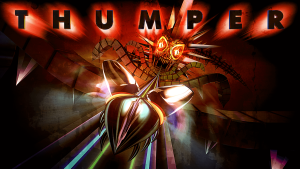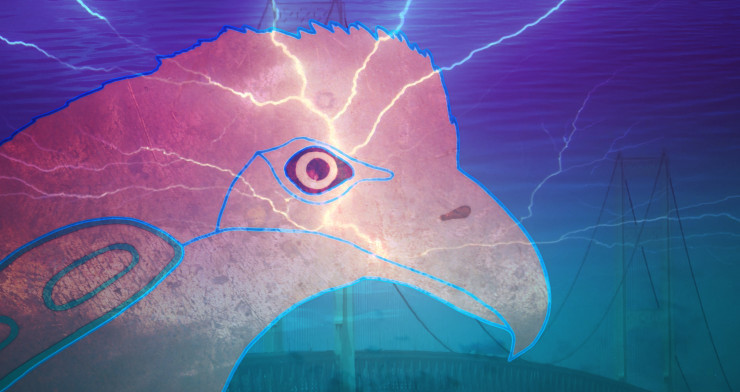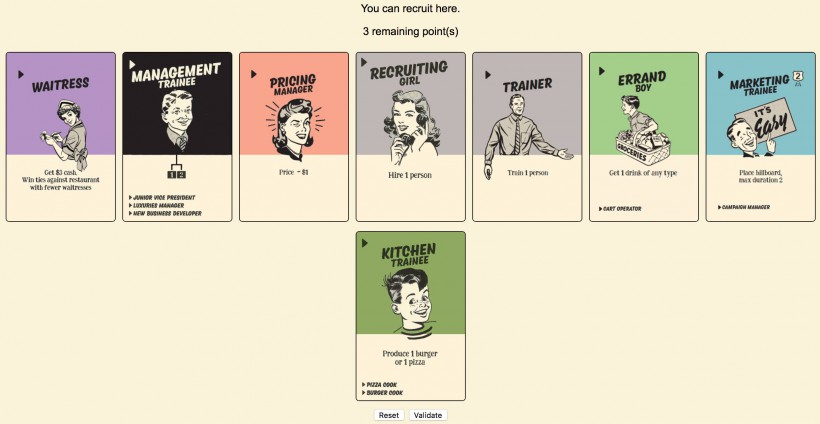I discovered Thumper on Steam (also available on PS4) when my friend recommended it to me last week, figuring I’d be interested in the soundtrack more than the game itself. Thumper (Drool) is based around a simple premise: ‘classic rhythm-action, blistering speed, and brutal physicality’. You play as a space beetle careening down a track at breakneck speed, interacting with various neon-lit obstacles and using energy pulses to fight looming monsters that look to be directly from a Lovecraftian fever dream, all in time to a dark Industrial beat. This aesthetic combined with the extreme intensity of gameplay means most reviews of Thumper refer to it as a game that induces stress, anxiety, and even fear, with some reviews going so far as to describe their reaction to the game as a feeling of deep existential dread.
This is what I expected as I began my Thumper playthrough, braced for an intense stress response, but that dread and fear never arrived. My experience playing as the lightning fast space beetle hurtling along the neon track towards the gaping maw of the boss monster, Crakhed, was instead a feeling of a deep existential kind of calm, an intense focus and concentration that left me fully immersed in the simple but gorgeous world of Thumper. The root of this feeling, while attributed in part to the nature of the game as a whole, also comes from the effect this style of game has on my emotions and my mind, not unique but certainly uncommon as far as experiences with games tend to go.
I have Tourette Syndrome. While it’s characterized by a combination of persistent repetitive involuntary movements and vocalizations, or tics, before I received my diagnosis my impression of the disorder was the comical stereotyped portrayal in popular culture of characters who swear uncontrollably. This is what most people think when they hear Tourettes, but the reality of it isn’t particularly funny. I’ve pulled muscles in my neck and jaw, coughed so hard I haven’t been able to breathe, and have been unable to sleep without medication since the beginning of 2012. Having tics is frustrating, embarrassing, and often painful, and they have significantly impacted my quality of life.
It’s difficult to see the connection between Tourette Syndrome (TS) and games at first glance. I discovered it by accident not long after I received my diagnosis. Most people with TS are diagnosed as children when the symptoms first present, but a number of factors, including work-related stress, led to my tics not manifesting in a severe manner until I was in my mid-twenties. I had already begun playing video games more regularly in my spare time, but as I returned to gaming as a hobby after my many hospital visits and tests, I discovered something interesting.
Playing certain video games made my tics better.
There are a number of ways to cope with a sudden increase of tics, or a waxing period. In my particular case, a waxing period can make it difficult for me to perform basic motor skills, exacerbate tics to the point that it strains muscles, and even make it impossible for me to speak. At first the way I dealt with this was taking the doctor prescribed medication, but the soporific side-effects meant I had to choose between dealing with my tics throughout my regular working day, or having to stay home. It was frustrating, to say the least.
When I discovered what games could do for my symptoms it was like a revelation combined with a deep relief, like I’d been given a brief respite from frequent discomfort and debilitating side-effects. It’s been almost five years since the onset of the worst of my tics, and I will comfortably attribute my love of playing games to the fact that, in many ways, playing games saved my life.
Any game that requires intense focus helps relax me, gives me the opportunity to leave my tics behind and concentrate on something that consumes my attention. Thumper easily latches onto this part of my mind, the part normally focused on the strange neurological misfirings that result in twitching, coughing, and jerking. When I’m playing, I’m completely absorbed in reaching the goals of each level, hitting the brightly lit obstacles and curves in a state of near serenity. Even repeated deaths can’t deter me (and there are deaths – if you hit a curve or a blockage at the wrong angle your journey abruptly ends with an explosion and you’re returned to the last checkpoint), they merely fill me with more determination to succeed, to try again.
Thumper is a simple game on its surface, an immersive and dark rethinking of traditional rhythm game concepts, but the variety of affective responses experienced during play indicate there’s more to it than violent tension. Players always bring their life experiences and contexts into the games they interact with, but these personal lenses are more obvious in story-based games, those with narratives and characters we can relate to and see ourselves in. Finding myself in a game like Thumper, as simple as the gameplay and premise appear, reminds me that even the most streamlined of mechanics and interactions can create a game that helps somebody, be it physically, mentally, or emotionally.
There is no cure for TS. I will have tics and twitches and even convulsions for the rest of my life. This fact, as unpleasant as it is, motivates me all the more to uncover things that can give me some relief. When I find a game that helps me, I want to play it until I wear out the space bar on my computer keyboard, shout to the world that I’ve found a way to take a break. I doubt the creators of Thumper were looking to create a game that induced a feeling of affective calm in a gamer with Tourette Syndrome, but the nature of the game, the intensity and required concentration, makes it a perfect game for the kind of focus I need to escape from my symptoms for a while.
Thumper is a simple game with complex effects, and the way that it and other games have given me relief from a lifelong disorder makes me curious as to how video games might be able to provide a kind of physical therapy for people with Tourettes or other neurological conditions. Experiences like mine indicate to me that the uses and possibilities for games extend into every realm of expression, be it deep analysis, storytelling, or mental and physical health. As games evolve it is clear that they will continue to push the boundaries of their medium, reaching people through everything from story to mechanics.






